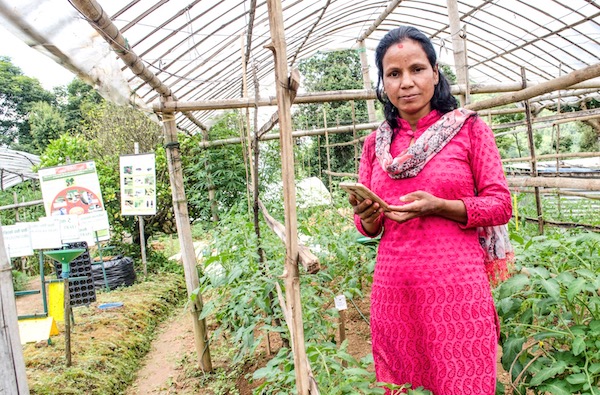
Photo: A Nepalese community business facilitator communicating crop recommendations through text messages with local farmers / Credit: Virginia Tech
Ever since Virginia Polytechnic Institute and State University (Virginia Tech) implemented a text-messaging system in Nepal, farmers have been able to ward off crop pests and diseases. And merchants have seen a 100% increase in sales of natural products. By receiving up-to-date pest and disease information, farmers could prepare for ways to feed their family for an entire year.
The problem is that many smallholder farmers live in remote areas with limited Internet access, which restricts information sharing. So the Feed the Future Innovation Lab for Integrated Pest Management at Virginia Tech partnered with iDE in Nepal for developing centers that provide commercial market access and links 160 farmers to crop experts through text messaging services. When pest or disease prevalence is higher, farmers will receive vetted identification details and safe integrated pest management (IPM) solutions to the crop problems.
The text messages include the contacts of local suppliers who sell IPM products like natural fertilizers. Since 2017, the local businesses have seen a 106% increase in sales. And farmers have reported impacts to their crops like relief from the tomato leafminer — which is a pest that devastates 85% of tomato yields.
“In all of our projects, we want to see improved capacity and ability at all levels, from farmers to their families to private businesses,” said Innovation Lab’s associate director Amer Fayad in a statement. “One of the biggest battles we face is delivery of information, and this system of text messages helps eliminate that problem.”
The text messages also contact the contact numbers of community business facilitators — who are entrepreneurial local farmers with training in IPM solutions. The facilitators give support to farmers with questions about crop management and they receive a commission from companies on the sale of IPM products. As a result, they have seen an 80% increase in contact from farmers and a 44% increase in income.
“These text messages are helpful because they don’t require Internet access and they are in the local language,” added iDE in Nepal project collaborator representative Lalit Sah. “Most families do, in fact, have access to at least one phone and also want to take information from people in the community who they trust.”
The Innovation Lab is also helping farming communities in Vietnam and East Africa by improving crop information sharing through WhatsApp. In Ethiopia, Tanzania, and Kenya, up to 66 farmers and Extension agents exchange messages on WhatsApp at a rate of about 52 messages per month.“Participants ask specific questions about plant problems, and within minutes another participant has provided some feedback, regardless of distance or geography,” explained The Ohio State University associate professor and head of the East Africa project Luis Canas. “This network has been very successful and now is being used to link smaller networks that connect directly to farmers in their local language. We expect this could create a new way to distribute knowledge and initiate collaborations in areas where computers are not very common.”
Farmers and Innovation Lab collaborators from the Southern Horticultural Research Institute in Vietnam also connect on a WhatsApp group that is designed for addressing issues with dragon fruit — which is one of their biggest fruit exports. And they also use it for IPM products, upcoming farmer training, and up-to-date market data.


